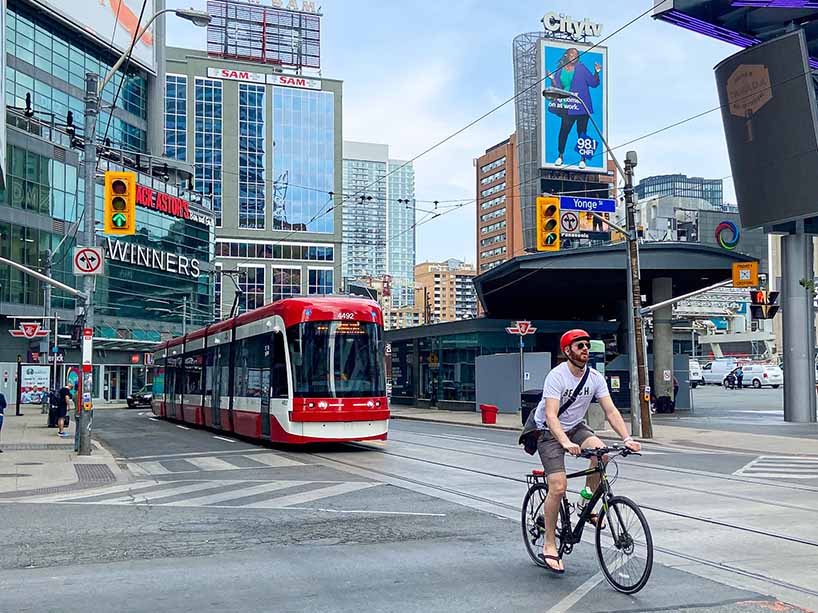Campus transportation recognized as most sustainable in global ranking

More than 90 per cent of community members use sustainable commuting options as their primary mode of transportation to campus, one of the factors earning a top ranking for the university.
The transportation modes used by the campus community topped a global ranking list that highlights the most sustainable colleges and universities. The (PDF file) 2021 Sustainable Campus Index (external link) conferred the top rank after looking at data about the quality and quantity of the campus fleet, how students and employees commute to campus and existing programs promoting sustainable transportation.
Published by the Association for the Advancement of Sustainability in Higher Education (external link) (AASHE), the annual report recognizes top-performing colleges and universities in 17 sustainability impact areas, as measured by the Sustainability Tracking, Assessment and Rating System (STARS).
“Our campus fleet, which refers to the vehicles owned by the university, is not very large and that contributed to the high rating. We have seven vehicles, out of which three are 100 percent electric vehicles,” said Stephanie MacPhee, sustainability manager at the sustainability office in Facilities Management and Development.
The campus grounds team mostly uses electric utility trucks and battery-operated grounds equipment instead of gasoline-operated ones to reduce the use of fossil fuels.
“Our location in downtown Toronto also contributed to our top ranking. We’re right on the subway line and community members have access to many forms of public transit, including biking and walking,” MacPhee said.
The rating highlighted a 2017 survey of students and employees facilitated by TransForm Lab in collaboration with StudentMoveTO (external link) , that found 96 per cent of students and 90 per cent of employees use more sustainable commuting options to come to campus.
A more recent survey completed by the sustainability office in 2021 found that more than 90 per cent of students, staff and faculty who responded to the survey use public transit, walk or carpool to campus.
Facilitating sustainable transportation
The facilities available on campus to promote sustainable transportation also contributed to the top rank. The rating took into account the university’s five electric vehicle charging stations, services offered to bicycle commuters and the university’s bicycle and pedestrian plans.
“Our campus offers 98 reserved secure bicycle parking spaces in the Daphne Cockwell Health Sciences Complex, with dedicated washroom and shower facilities for permit holders,” MacPhee said. “There are over 1,100 bicycle parking spots across campus in a variety of styles. The racks are part of a campus-wide bicycle program developed in conjunction with the City of Toronto’s bicycle friendly campuses project.”
Additionally, Bike Share Toronto (external link) has seven locations in and around the university campus that are available for use to community members.
The university’s multiple plans that set the standards and practices for safe campus streets were also highlighted in the rating. These include the Campus Public Realm Plan and the Campus Master Plan 2020.
“With most people working remotely over the last couple years and a hybrid work model in the future, fewer people will be commuting to campus. Presumably, having flexible work arrangements will contribute to an even lower carbon footprint,” said MacPhee.
In 2020, the sustainability office submitted the university’s first STARS report (external link) and earned a silver rating that will be used as a benchmark to measure future sustainability efforts and progress. This rating recognizes university sustainability programs and initiatives in categories such as academics, engagement, operations and planning and administration.
Championing sustainability
Key academic highlights from the data collected for the STARS report include the 536 sustainability related courses (15 per cent) offered to undergraduate and graduate students and the 277 faculty members (30 per cent) engaged in sustainability-related research.
“The sustainability office has taken significant steps over the past few years to improve waste infrastructure on campus through the installation of approximately 550 new standardized waste receptacles with improved, consistent signage across campus,” said MacPhee. “Further, 75 per cent of food grown by the Urban Farm in 2020 was donated to emergency food relief organizations in and around campus. The OZZI reusable container program, used by residence dining halls, also helped avoid the use of 150,000 single-use containers.”
Being champions of sustainability was identified as one of five university values in the 2020-2030 Strategic Vision. The sustainability office supports the university in achieving this vision by engaging and partnering with campus stakeholders to create a culture of sustainability and working towards integrating sustainability across all areas of the university.
The 2021 Sustainability Progress Report mentions many more programs and initiatives led by various groups at the university. With the goal to recognize achievements while identifying areas where more effort is required, the report highlights achievements since the release of the last sustainability progress report in 2017.
Students have the opportunity to champion sustainability and help make a difference on campus through the Sustainability Ambassador Program. Offered by the sustainability office as part of Level Up that allows students to earn microcredentials while getting involved on campus, the ambassador program engages students in impactful campaigns focusing on sustainability areas including zero waste, climate action and education.
For other ways to get involved with building a more sustainable campus, visit the sustainability office website.